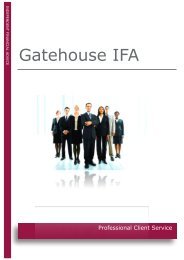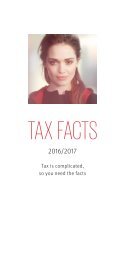wealthguide
Create successful ePaper yourself
Turn your PDF publications into a flip-book with our unique Google optimized e-Paper software.
GUIDE TO WEALTH PRESERVATION 05<br />
Individuals in defined benefit (final salary<br />
schemes) may not have these flexible options<br />
and may want to consider switching out of their<br />
current scheme and into a personal pension<br />
to achieve this flexibility. However, depending<br />
on the terms of the particular defined benefit<br />
scheme concerned, the cost of such a switch<br />
could be prohibitive. Anyone considering this<br />
issue is required by law to prove that they have<br />
taken financial advice from an independent<br />
financial adviser before such a transfer can take<br />
place (if the transfer value is £30k or more).<br />
TAX-FREE PENSION CONTRIBUTIONS<br />
For employees, particularly those paying<br />
basic-rate tax, pension contributions made by<br />
your employer are tax-efficient, as there is no<br />
tax to pay on this benefit and the employer<br />
can claim a business tax deduction. If you own<br />
the company, this can be a tax-efficient way to<br />
extract value.<br />
FOR EMPLOYEES,<br />
PARTICULARLY<br />
THOSE PAYING BASIC-<br />
RATE TAX, PENSION<br />
CONTRIBUTIONS MADE<br />
BY YOUR EMPLOYER ARE<br />
TAX-EFFICIENT, AS THERE<br />
IS NO TAX TO PAY ON<br />
THIS BENEFIT AND THE<br />
EMPLOYER CAN<br />
CLAIM A BUSINESS<br />
TAX DEDUCTION.<br />
It is often worth setting up arrangements<br />
where employees exchange some of their salary<br />
in return for a larger pension contribution<br />
made by the employer. This saves on National<br />
Insurance Contributions that would have been<br />
paid by both employer and employee, and the<br />
savings can be passed on as higher pension<br />
contributions. However, for 2016/17 and later<br />
years, this may not be effective for high earners.<br />
With regards to pension contributions made on<br />
their behalf by employers as a result of salary<br />
sacrifice arrangements started after 8 July 2015,<br />
the income sacrificed will be added back on as<br />
part of threshold income to establish whether<br />
threshold income exceeds £110,000. Tax<br />
relief on personal contributions is restricted<br />
if threshold income exceeds £110,000 and<br />
adjusted income exceeds £150,000.<br />
A PENSION IS A LONG-TERM<br />
INVESTMENT. THE FUND VALUE MAY<br />
FLUCTUATE AND CAN GO DOWN,<br />
WHICH WOULD HAVE AN IMPACT<br />
ON THE LEVEL OF PENSION BENEFITS<br />
AVAILABLE.<br />
YOUR PENSION INCOME COULD ALSO<br />
BE AFFECTED BY INTEREST RATES AT<br />
THE TIME YOU TAKE YOUR BENEFITS.<br />
THE TAX IMPLICATIONS OF PENSION<br />
WITHDRAWALS WILL BE BASED ON<br />
YOUR INDIVIDUAL CIRCUMSTANCES,<br />
TAX LEGISLATION AND REGULATION,<br />
WHICH ARE SUBJECT TO CHANGE IN<br />
THE FUTURE




